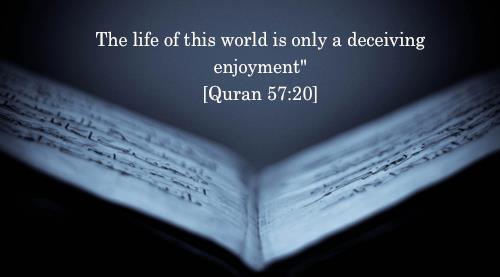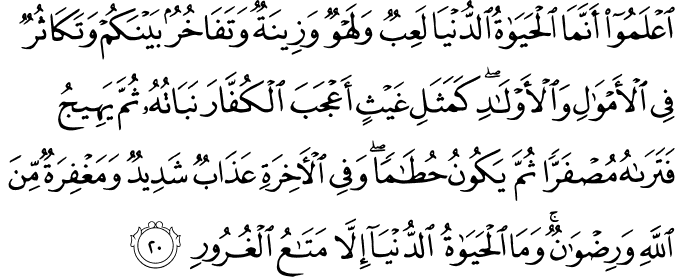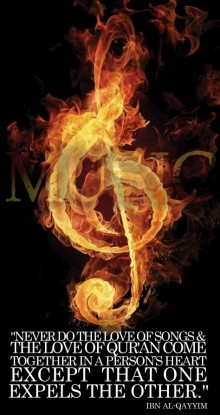it’s Jummah – Did your read Surah Kahf yet?
Posted in Daily Islam,QuranJune 1, 2012No comments
Posted in Daily Islam,QuranMay 31, 2012No comments
Posted in Daily Islam,QuranMay 31, 2012No comments

Surely We have brought them a Book which We expounded with knowledge; a guidance and a mercy to those who believe. Surah Al-A’raf [7:52]
VISIT iloveallaah.com FOR MORE OPTIONS AND DETAILS
Posted in Daily Islam,QuranMay 30, 2012No comments



Know that the life of this world is but amusement and diversion and adornment and boasting to one another and competition in increase of wealth and children – like the example of a rain whose [resulting] plant growth pleases the tillers; then it dries and you see it turned yellow; then it becomes [scattered] debris. And in the Hereafter is severe punishment and forgiveness from Allah and approval. And what is the worldly life except the enjoyment of delusion. (57:20)
Posted in Daily Islam,QuranMay 30, 2012No comments
O our Lord! Do not hold us responsible if we forget or make a mistake. O our Lord, do not lay on us a burden such as You laid on those before us. O our Lord, do not impose upon us that which we have not the strength (to bear). Pardon us, and forgive us, and have mercy on us. You are our Lord-master, so help us against the unbelieving people
[surah Baqarah; 2:286]
Posted in Daily IslamMay 29, 2012No comments

Janaza — The funeral prayer

everything u need to know about Salatul Janaza ” Funeral prayers ”
Salatul Janzah is Fard Kafayah, that is, if one prays the prayer than all are bareeuz zimma [free of the responsiblity] otherwise all those who received the news but did not come are sinners. Jammat is not a condition for this prayer, it is sufficient even if one person prays, and to deny the fardiat, compulsion, of this salah is kufr, an act of disbelief .
* Abu Hurrairah (may Allah be pleased with him) reports that Allah’s Messenger (e) said:
“He who offered prayer over the dead, but did not follow the bier, for him is the reward of one qirat, and he who followed it, for him is the reward of two qirats. It was asked what the qirats were. He said the smaller among the two is equivalent to Uhud.” (Muslim)
*Prayers (Salat)
– This prayer is done while one is standing – there is no ruku or sujud in it.
– It is better that those praying divide themselves into three or more odd number of rows facing the qibla with the Imam in front.
– Put the body (or bodies) in front of the Imam.
– The Imam should stand by the middle of the body if the deceased is a man and by the shoulder if she is a woman.
– If there is more than one body, then they should be put one in front of the other, those of the men nearest to the Imam and those of the women furthest from him.
– Having the appropriate neeyat in your heart, raise your hands in the usual manner and say, Allahu Akbar.
– Then fold and hold your hands on your breast in the usual manner, the right hand on the left.
– Read Sana quietly.
“Subhanaka Allah humma wa bihamdika, wa tabaraka ismuka, wa ta’ala jadduka, wa la ilaha ghairuk”
(Glory be to You Oh Allah, and praise be to You, and blessed is Your name, and exalted is Your Majesty, and there is none to be served besides You.)
** Follow the Imam
There are 4 takbir’s
1. After the 1st takbir, read Surah-al-Fatiha
2. After the 2nd takbir, read the Salawaat , It is better if you recite the whole Salatul-Ibrahimiyyah in the same way as you do in tashahud .
“Allah umma salli a’la Muhammadin wa ala aali Muhummadin, kama sallaita ala Ibraheema, wa ala aali Ibraheem, innaka hameedun majeed. Allah u mma barik a’la Muhammadin wa ala aali Muhummadin, kama barakta ala Ibraheema, wa ala aali Ibraheem, innaka h ameedun majeed”.
(O Allah! shower Your mercy upon Muhammad and the followers of Muhammad , as You showered Your mercy upon Ibrahim and the followers of Ibrahim. Behold, Your are Praiseworthy, Glorious.
Oh Allah! Shower Your blessing upon Muhammad , and the followers of Muhammad as You showered Your blessings upon Ibrahim and the followers of Ibrahim. Behold, You are Praiseworthy, Glorious.)
3. After the 3rd takbir, make dua for the deceased
“Allahumma ighfir lihaayina wa mayitina wa shaahidina wa ghaa’ibina wa sagheerina wa kabeerina wa dhakarina wa unthaana. Allahumma man ahyaytahu minna fa ahyihi ‘ala’l-Islam wa man tawaffaytahu minna fa tawiffahu ‘ala’l -eemaan. Allahumma ighfir lahu warhamhu wa ‘aafihi wa a’fu ‘anhu, wa akrim nuzulahu wa wassi’ madkhalahu waghsilhu bi’l -maa’ wa’l -thalj wa’l-barad, wa naqqihi min al-khataaya kama yunaqqa’ althawb al-abyad min al-danas. Allahumma abdilhu daaran khayra min daarihi wa ahlan khayra min ahlihi. Allahumma adkhilhu al-jannah wa a’idhhu min ‘adhaab il-qabri wa min ‘adhaab il-naar wa afsah lahu fi qabrihi wa nawwir lahu fihi. Allahumma laa tahrimna ajrahu wa la tadillanaa ba’dahu”
(O Allah, forgive our living and our dead, those who are present among us and those who are absent, our young and our old, our males and our females. O Allah, whoever You keep alive, keep him alive in Islam, and whoever You cause to die, cause him to die with faith. O Allah, forgive him and have mercy on him, keep him safe and sound and forgive him, honour the place where he settles and make his entrance wide; wash him with water and snow and hail, and cleanse him of sin as a white garment is cleansed of dirt. O Allah, give him a house better than his house and a family better than his family. O Allah, admit him to Paradise and protect him from the torment of the grave and the torment of Hell-fire; make his grave spacious and fill it with light. O Allah, do not deprive us of the reward and do not cause us to go astray after this).”
All of this was narrated from the Prophet (peace and blessings of Allah be upon him).
If you make du’a with other words, this is permissible. For example, one could say,
“Allahumma in kaana muhsinan fa zid fi ihsaanihi wa in kaana musee’an fa tajaawaz ‘an sayi’aatihi. Allahumma ighfir lahu wa thabbit-hu bi’l-qawl il-thaabit
(O Allah, if he was a doer of good, then increase his good deeds, and if he was a wrongdoer, then overlook his bad deeds. O Allah, forgive him and give him the strength to say the right thing).”
4. After the 4th takbir, pause for a little while, then you say one Tasleem to the right, saying “Assalaamu ‘alaykum wa rahmat-Allah.” Make tasleem, to the right only.
~ may Allah have mercy on the souls of our dead and all Mulslims Aameen
Posted in Daily Islam,QuranMay 29, 2012No comments
And O Prophet, enjoin the believing men to restrain their gaze and guard their private parts. This is a more righteous way for them: Allah has knowledge of what they do.(24:30)
O Prophet, enjoin the believing women to restrain their gaze and guard their private parts. and not to display their adornment except that which is displayed of itself, and to draw their veils over their bosoms and not to display their adornment except before their husbands, their fathers, the fathers of their husbands, their sons and the sons of their husbands (from other wives), their brothers, their brothers’ sons, their sisters’ sons, their female associates and those in their possession and male attendants incapable of sex desire and those boys who have not yet attained knowledge of sex matters concerning women; also forbid them to stamp their feet on the ground lest their hidden ornaments should be displayed. O Believers, turn all together towards Allah : it is expected that you will attain true success. (24:31)
Posted in Daily IslamMay 28, 2012No comments

In the name of Allah, Most Compassionate, Most Merciful,
The worst case scenario in the event of being inflicted with a disease is when the one involved refuses to believe that he has been inflicted with that disease. The way this phenomenon is accepted and recognised in diseases and illnesses that affect the physical body, it is also true with regards to spiritual diseases and ailments.
When a person commits a sin (may Allah save us all) believing that a sin is being committed and feels regret and remorse in the heart, then this is far better then committing the sin and believing it to be lawful (halal). In the former situation, only one sin is being committed, and it is very likely that the individual may repent out of the remorse felt in the heart. In the latter case, however, in addition to the sin being committed, there is the greater sin of trying to justify it. Normally, such an individual does not receive the guidance to repent from his sin. (May Allah save us all, Ameen).
Music and Singing?
The case with music and unlawful singing is the same. It has been decisively prohibited in Shariah, as the evidences mentioned further along will show. Yet there are individuals that are not ready to believe that it is Haram.
In the modern era, music has spread to such an extent that nobody is free from it. Individuals are confronted with situations where they are forced to listen to music. It is played nearly in all department stores and supermarkets. If you sit in a taxi, make a phone call or even walk down the street, you will not be saved from this evil. Young Muslims drive around in their cars with the music fully blasted. The increasing popularity of music, which is prevalent in our society, poses a great threat to the Muslims.
Music is a direct ploy of the Non-Muslims. One of the main causes for the decline of the Muslims is their involvement in useless entertainment. Today we see that Muslims are involved, and at the forefront perhaps, of many immoralities and evils. The spiritual power which once was the trait of a Muslim is nowhere to be seen. One of the main reasons for this is music and useless entertainment.
Harms and effects of music
We should be aware that nothing has been prohibited by the Almighty Creator except that which is harmful to the Muslims and the society as a whole. There are great harms and ill-effects of music.
Islam totally forbids adultery and also those things that lead to it. Allah Most High says:
“And do not come near to adultery, for it is a shameful deed and an evil, opening the road (to other evils)” (al-Isra, 32).
Islam does not only prohibit adultery and fornication, but also those things that may lead to it. This is the reason why the Qur’an orders Muslim men and Women to lower their gazes. It prohibits one from being alone with someone from the opposite sex (khalwa). Informal interaction with the opposite sex has also been made unlawful.
This is also one of the main reasons for the prohibition of music, as it effects one’s emotions, creates arousal, passion and excitement, and also leads to various physiological changes in the person. It is a psychological proven fact that two things are instrumental in arousing the human sexual desire, one being the voice of a female (for males) and the other music.
This is the reason why Allah Most High says:
“O wives of the prophet! You are not like other women, if you are god-fearing. So do not be soft in speech. Lest in whose heart is disease should be moved with desire.” (Surah al-Ahzab, v. 32).
Thus, Islam forbids listening to the female voice with lust and desire. The great Hanafi Jurist, Ibn Abidin (Allah have mercy on him) states:
“It is permissible for women to converse with non-Mahram men at the time of need (and visa versa, m). However, what is not permissible is that they stretch, soften and raise their voice in a melodious way” (Radd al-Muhtar, V.1, P. 406).
Similarly, it is also unlawful for women to listen to the voice of non-Mahram men with lust and desire. One of the great western thinkers said: “the voice is one of the quickest ways that make a woman fall in love with a man. This is the reason why many women adore singers”.
The Messenger of Allah (Allah bless him & give him peace) was also wary of this fact when he said to the Companion Bara ibn Malik: “O Bara! Let not the women here your voice” (Kanz al-Ummal, 7/322). The same has also been reported from the Companion Anjasha (Allah be pleased with him).
Physical Effect of Music
Experiments carried out by doctors and researchers confirm that music is such that it does not only affect the brain, but each and every organ of the body. There is a close relationship between music and bodily movements.
It is also proved that music affects one’s emotions, increases arousal in terms of alertness and excitement and also leads to various psychological changes in the person. In a psychological experiment, it was found that listening to moderate type of music increased one’s normal heart beat, whilst listening to rock music the heart beat increased even further, yet people claim that music has no effect.
In conclusion, music and the instruments used for singing are a cause for arousing the sexual desire of an individual. It could lead a person to adultery and fornication. Therefore, Islam takes the preventive measure rather than suffer the consequences. This is also one of the principles of Islamic Jurisprudence, namely ‘blocking the means’ (sadd al-dhara’i). This is based on the idea of preventing an evil before it actually materializes, and is taken from the heart of the guidance of the Qur’an and Sunnah that, “Preventing harm is given precedence even to achieving possible benefits.”
Becoming Heedless of Allah
One of the harms of music is that it distracts one from his Creator. It serves as a temporary means of pleasure and satisfaction, which makes one forget who he really is and why he was created. This is the reason why musical instruments are known in the Arabic language as ‘malaahi’ meaning instruments that prevent one from the remembrance of Allah Almighty.
Human has been created for a noble purpose. Allah Most High says:
“I have created jinn and humans only that they serve (worship) me” (Surah al-Dhariyat, 56).
Music and temporary entertainments sink the human in physical pleasures and prevent him/her from true spiritual gains. In conclusion, music has a great role to play in preventing a human from realising the purpose of creation.
Un-Islamic Values
Another harm of music is that it instills the ideologies of the Non-Muslims in the heart and mind. The messages of today’s music follow a general theme of love, fornication, drugs and freedom.
We find that the whole world is obsessed with the Kufr idea of unrestrained freedom, i.e. freedom of speech and movement, etc… This idea of freedom, “it’s my life, I’ll do what I want” is a predominant theme of music today. It is used as a means of drilling western ideologies into the hearts and minds, which are totally contrary to Islamic values and teachings.
The Difference Between Legal Wisdom and Legal Reasons
The above are just some of the harms and evil effects of music. One must remember here that these are the wisdoms for the prohibition of music and not the reason (illah). The Shariah ruling is based upon the reason, and not the wisdom. In other words if the harms for the prohibition of music is taken care of, it does not make music permissible.
An example for this is that the wisdom behind the prohibition of wine and alcohol is that it creates enmity and hatred between people and it hinders one from the remembrance of Allah. The reason, however, is that it is an intoxicating substance. Now, if one was to say that wine will be Halal for me, as I will lock myself up after drinking wine, thus no destruction will be caused. Any sane person will conclude that he is wrong, as wine is Haram whether you cause any destruction and damage to others or not. The reason being, that the cause for the prohibition of wine is that it intoxicates you, regardless of whether the wisdom is present or not.
The same is with music. If one is saved from the abovementioned harms, even then music will still remain Haram. It can not be held lawful even if one is saved from its harms. This is a well established principle in the science of Usul al-Fiqh.
Ruling on musical instruments and unlawful singing
In the light of the evidences that will be mentioned later, the following are unlawful in Shariah:
a) Musical instruments that are exclusively designed for entertainment and dancing, and create charm, pleasure and bliss on their own (even without the singing), such as the drum, violin, guitar, fiddle, flute, lute, mandolin, harmonium, piano, string, etc… are impermissible to use under any circumstance.
There is a consensus of the whole Ummah on this. Since the first century, the Companions (sahaba), their followers (tabi’een), jurists (fuqaha) and the scholars have been generally unanimous on this ruling.
b) Singing that is a cause for a sin is also unlawful with the consensus of all the scholars, such as songs that prevent one from the obligatory (fard & wajib).
c) Any singing that is accompanied by other sins, such as songs that consist of unlawful, immoral, and sexual themes, or it is sang by non-Mahram women, etc will also be unlawful. This ruling is also with the consensus of all the scholars.
Evidences
There are numerous evidences in the Qur’an and Sunnah which support this view. We will attempt to look at a few:
1) Allah Most High says:
“And there are among men, those that purchase idle tales, to mislead (men) from the path of Allah and throw ridicule. For such there will be a humiliating punishment” (Surah Luqman, V. 6).
The great Companion Abd Allah ibn Mas’ud (Allah be pleased with him) states in the explanation of the word “idle tales”:
“By Allah its meaning is music” (Sunan al-Bayhaqi, 1/223 & authenticated by al-Hakim in his Mustadrak, 2/411).
Imam Ibn Abi Shayba related with his own transmission that He (Ibn Mas’ud) said:
“I swear By Him besides whom there is no God that it refers to singing” (132/5).
The great Companion and exegete of the Qur’an, Abd Allah ibn Abbas (Allah be pleased with him) states:
“The meaning of the word is music, singing and the like” (Sunan al-Bayhaqi, 1/221& Musannaf Ibn abi Shayba, 132/5).
He also stated:
“Music and the purchase of female singers” (Musannaf Ibn Abi Shayba, 132/5).
Hasan al-Basri (Allah be pleased with him) said:
“This verse was revealed in relation to singing and musical instruments” (Tafsir ibn Kathir, 3/442)
The same explanation has also been narrated from Mujahid, Ikrima, Ibrahim Nakha’i, Mak’hul and others (Allah be pleased with them all).
The above verse of the Qur’an, along with the statements regarding its meaning is clear in the prohibition of music. It also serves as a severe warning for those who are involved in the trade of music in any way, shape or form, as Allah warned them of “Humiliating punishment”.
As for those that say, the verse refers to things that prevent one from the remembrance of Allah and not music, do not contradict the aforementioned explanation. The interpretation of the verse with “things that prevent one from the remembrance of Allah” is a more general interpretation which includes music and song, as one of the foremost things that stop you from the remembrance of Allah is music. This is the reason why the majority of the exegetes of the Qur’an have interpreted the verse with music only, or with all those acts that prevent one from the truth with music being at the forefront.
2) Allah Most High says whilst describing the attributes of the servants of the Most Compassionate (ibad al-Rahman):
“Those who witness no falsehood, and if they pass by futility, they pass by it with honourable avoidance” (Surah al-Furqan, V. 72).
Imam Abu Bakr al-Jassas relates from Sayyiduna Imam Abu Hanifah (Allah be pleased with him) that the meaning of “falsehood (zur)” is music & song, (Ahkam al-Qur’an, 3/428).
3) Allah Most High said to Shaytan:
“Lead to destruction those whom you can among them with your (seductive) voice” (Surah al-Isra, V.64).
One of the great exegete, Mujahid (Allah have mercy on him) interpreted the word “voice (sawt)” by music, singing, dancing and idle things. (Ruh al-Ma’ani, 15/111).
Imam Suyuti (Allah have mercy on him) quoted Mujahid as saying: “Voice (in this verse) is singing and flute” (al-Iklil fi istinbat al-tanzil, 1444).
Another exegete, Dahhak (Allah have mercy on him) also interpreted the word “Sawt” with flutes. (Qurtubi, al-Jami` li Ahkam al-Qur’an, 10/288).
Here also, a general interpretation can be given, as indeed some commentators of the Qur ‘ an have done, but this, as mentioned earlier, does not contradict the meaning given by Mujahid and Dahhak, as it is included in the more broad and general meaning.
Guidance of the Messenger of Allah(Allah bless him & give him peace)
The are many Ahadith of the blessed Messenger of Allah (Allah bless him & give him peace) which prohibit music and the usage of musical instruments to the extent that some scholars have gathered approximately forty Ahadith, of which the chain of transmission of some is sound (sahih), some good (hasan) and some weak (da’if). We will only mention a few here:
1) Sayyiduna Abu Malik al-Ash’ari (Allah be pleased with him) reports that he heard the Messenger of Allah (Allah bless him & give him peace) say: “There will appear people in my Ummah, who will hold adultery, silk, alcohol and musical instruments to be lawful” (Sahih al-Bukhari)
2) Abu Malik al-Ash’ari (Allah be pleased with him) narrates a similar type of Hadith, but a different wording. He reports that the Messenger of Allah (Allah bless him & give him peace) said: “Soon there will be people from my Ummah who will consume alcohol, they will change its name (by regarding it permissible. m), on there heads will be instruments of music and singing. Allah will make the ground swallow them up, and turn them into monkeys and swine” (Sahih Ibn Hibban & Sunan Ibn Majah, with a sound chain of narration).
In the above two narrations, the word ma`azif is used. The scholars of the Arabic language are unanimous on the fact that it refers to musical instruments (Ibn Manzur, Lisan al-Arab, V.9, P.189).
The prohibition of musical instruments is clear in the two narrations. The first Hadith (recorded in Sahih al-Bukhari) mentions that certain people from the Ummah of the Messenger of Allah (Allah bless him & give peace) will try to justify the permissibility of using musical instruments, along with adultery, silk and alcohol, despite these things being unlawful (haram) in Shariah.
Moreover, by mentioning music with the likes of adultery and alcohol just shows how severe the sin is. The one who attempts to permit music is similar to the one who permits alcohol or adultery.
The second Hadith describes the fate of such people in that the ground will be ordered to swallow them and they will be turned into monkeys and swine (may Allah save us all). The warning is specific to those that will hold music, alcohol, silk and adultery to be permissible. It is something that should be of concern for those who try and justify any of these things.
Also, to say that music will only be unlawful if it is in combination with alcohol, adultery and silk is incorrect. If this was the case, then why is it that the exception is only for music from the four things? The same could also be said for adultery, alcohol and silk. One may then even justify that alcohol and adultery is also permissible unless if they are consumed in combination with the other things!
Thus the above two narrations of the beloved of Allah (Allah bless him & give him peace) are clear proof on the impermissibility of music and songs.
3) Imran ibn Husain (Allah be pleased with him) reports that the Messenger of Allah (Allah bless him & give him peace) said: “This Ummah will experience the swallowing up of some people by the earth, metamorphosis of some into animals, and being rained upon with stones”. A man from amongst the Muslims asked: “O Messenger of Allah! When will this be?” He said: “When female singers and musical instruments appear and alcohol will (commonly) be consumed” (Recorded by Imam Tirmizi, Imam Ibn Majah in their respective Sunan collections, and the wording here is of Sunan Tirmizi).
4) Sayyiduna Ali ibn Talib (Allah be pleased with him) reports that the blessed Messenger of Allah (Allah bless him & give him peace) said: “When my Ummah begin doing fifteen things, they will be inflicted with tribulations, and (from those 15 things He said): “When female singers and musical instruments become common” (Sunan Tirmizi).
5) Na’fi reports that once Abd Allah ibn Umar (Allah be pleased with them both) heard the sound of a Sheppard’s flute. He put his fingers in his ears, turned his mule away from the road and said: “O Nafi’! Can you hear? I (Nafi’) replied with the affirmative. He carried on walking (with his fingers in his ears) until I said: “the sound has ceased” He removed his fingers from his ears, came back on to the road and said: “I saw the Messenger of Allah (Allah bless him & give him peace) doing the same when he heard the flute of the Sheppard” (Recorded by Imam Ahmad in his Musnad and Abu Dawud & Ibn Majah in their Sunans).
6) Abd Allah Ibn Umar (Allah be pleased with him) reports that the Messenger of Allah (Allah bless him & give him peace) said: “Verily Allah has forbidden alcohol, gambling, drum and guitar, and every intoxicant is haram” (Musnad Ahmad & Sunan Abu Dawud).
7) Abu Umama (Allah be pleased with him) reports that the Messenger of Allah (Allah bless him & give peace) said: “Allah Mighty and Majestic sent me as a guidance and mercy to believers and commanded me to do away with musical instruments, flutes, strings, crucifixes, and the affairs of the pre-Islamic period of ignorance” (Musnad Ahmad & Abu Dawud Tayalisi).
8) Abd Allah ibn Mas’ud (Allah be pleased with him) reports that the Messenger of Allah (Allah bless him & give him peace) said: “Song makes hypocrisy grow in the heart as water does herbage” (Sunan al-Bayhaqi).
9) Anas (Allah be pleased with him) reports that the Messenger of Allah (Allah bless him & give peace) said: “On the day of Resurrection, Allah will pour molten lead into the ears of whoever sits listening to a songstress” (Recorded by Ibn Asakir & Ibn al-Misri).
10)Abu Huraira (Allah be pleased with him) reports that the Messenger of Allah (Allah bless him & give him peace) said: “Bell is the flute of Shaytan” (Sahih Muslim & Sunan Abu Dawud).
There are many more narrations of the Messenger of Allah (Allah bless him & give peace) in prohibition of musical instruments and unlawful singing. I have merely mentioned a few as an example.
The imam of the Shafi`i school, Imam Ibn Hajr al-Haytami gathered all these Ahadith which approximately total to forty in his excellent work ‘ Kaff al-Ra’a an Muharramat al-Lahw wa al-Sama’ , and then said: “All of this is explicit and compelling textual evidence that musical instruments of all types are unlawful” (2/270).
Statements of the Fuqaha
The great Hanafi jurist al-Kasani states:
“If a singer gathers people around him only to entertain them with his voice, then he will not be considered a upright person (a’dil), even though if he does not consume alcohol, as he will be considered the leader of sinners. If however, he only sings to himself in order to eradicate loneliness, then there is nothing wrong in doing so.
As far as the one who uses musical instruments is concerned, if the instruments themselves are not unlawful, such as the bamboo and tambourine, then there is nothing wrong with that and he will still be considered upright. However, if the instrument is unlawful, such as the lute and the like, then he will not be considered a upright person (to be a witness in the court. m), as these instruments can never be considered lawful” (Bada’i al-Sana’i, 6/269).
It is stated in Khulasat al-Fatawa:
“Listening to the sound of musical instruments is unlawful (haram), as the Messenger of Allah (Allah bless him & give him peace) said: “Listening to songs is a sin” (4/345).
Ibn Humam, the great Hanafi Mujtahid makes a decisive statement in his famous Fath al-Qadir:
“Unlawful (haram) singing is when the theme of the song consists of unlawful things, such as the description of a particular living person’s beauty and features, the virtues of wine that provoke wine-drinking, the details and particulars of family affairs or those songs that mock and ridicule others.
However, songs that are free from such unlawful things and they consist of descriptions of the natural things, such as flowers and streams, etc… will be permissible. Yes, if they are accompanied by musical instruments, then it will be unlawful even if the song is full of advice and wisdom, not because of what the songs consist of, rather due to the musical instruments that are played with it.
And it is stated in the al-Mugni of Ibn Qudamah (Hanbali Madhhab) that musical instruments are of two types:
1) Unlawful, Such as those that are specially designed for entertainment and singing, like the flute and mandolin, etc…
2) Lawful, like the playing of the tambourine (daff) at weddings and other happy occasions” (Ibn Humam, Fath al-Qadir, 6/36).
The same has more or less been mentioned in the other Hanafi works also, such as al-Ikhtiyar, al-Bahr al-Ra’iq, al-Fatawa al-Hindiyya and others.
Imam an-Nawawi, the great Hadith and Shafi’i scholar states:
“It is unlawful to use or listen to musical instruments, such as, those which the drinkers are known for, like the mandolin, lute, cymbals, and flute. It is permissible to play the tambourine (daf) at weddings, circumcisions and other times, even if it has bells on its sides. Beating the Kuba, a long drum with a narrow middle, is also unlawful” (Mugni al-muhtaj, 4/429, & Reliance of the traveller, 775).
There are many other statements of the Fuqaha and scholars such al-Qurtubi, and each of the four Madhhabs, but due to the length of the article, I will suffice with the above.
As for those who hold music to be lawful usually present the Hadith of Sahih al-Bukhari in which two girls were singing in the presence of the Messenger of Allah (Allah bless him & give him peace) and Sayyida A’isha (Allah be pleased with her).
However, the permissibility of music can not be justified with this Hadith. The Hadith expert, Ibn Hajr al-Asqalani has refuted this claim in length in his Fath al-Bari, 2/345).
Firstly, theses young girls were singing without any unlawful musical instruments and secondly, the content of the song was regarding war, thus perfectly lawful. Also, they were not professional singers as the words of the Hadith clearly indicate.
Some try to justify music with the Hadith in which the permissibility of playing the tambourine (daf) is mentioned.
However, as stated in the works of the Fuqaha, to play the tambourine is permissible at weddings, as it is not designed for sole entertainment and pleasure, rather for announcement, etc…
Conclusion
In the light of the above evidences from the Qur’an, sayings of our beloved Messenger of Allah (Allah bless him & give peace) and texts of the various Fuqaha, the following is the decisive ruling with regards to music:
Musical instruments that are solely designed for entertainment are unlawful, with or without singing. However, to play the tambourine (daf) at weddings (and other occasions according to some fuqaha) will be permissible.
As far as the songs are concerned, if they consist of anything that is unlawful or they prevent one from the obligatory duties, then they will be unlawful. However, if they are free from the abovementioned things (and they are not accompanied by instruments), then it will be permissible to sing them.
And Allah Knows best
Muhammad ibn Adam al-Kawthari, UK
Posted in Daily Islam,QuranMay 28, 2012No comments
And I have chosen you, so listen to what is revealed [to you].Indeed, I am Allah . There is no deity except Me, so worship Me and establish prayer for My remembrance.Indeed, the Hour is coming – I almost conceal it – so that every soul may be recompensed according to that for which it strives.So do not let one avert you from it who does not believe in it and follows his desire, for you [then] would perish.[20:13 – 20:16]
Posted in Daily Islam,QuranMay 28, 2012No comments

(Abraham said) “They are all enemies to me except the Lord of the universe Who created me and Who guides me, Who gives me food and drink, and Who, when I am ill, heals me, Who will cause me to die and then will again restore me to life, Who, I hope, will forgive me my sins on the Day of Judgement.”(26:77-82)
Posted in Daily Islam,QuranMay 25, 2012No comments
“Do not follow the whims of those who have no knowledge (of Islam).”
[45:18]
Posted in Daily Islam,QuranMay 23, 2012No comments
If you avoid the major sins which you are forbidden, We will remove from you your lesser sins and admit you to a noble entrance [into Paradise].(4:31)
Posted in Daily Islam,QuranMay 23, 2012No comments

Indian Muslim youths read the Quran, Islam’s holy book, on a cool morning near Jama Masjid in New Delhi, India
Photo from PhotoBlog
Posted in Daily Islam,QuranMay 23, 2012No comments
Allah does not take you to task for the oaths you utter vainly, but He will certainly take you to task for the oaths you have sworn in earnest.
The expiation (for breaking such oaths) is either to feed ten needy persons with more or less the same food as you are wont to give to your families, or to clothe them, or to set free from bondage the neck of one man; and he who does not find the means shall fast for three days. This shall be the expiation for your oaths whenever you have sworn (and broken them), and do keep your oaths.
Thus does Allah make clear to you His commandments; maybe you will be grateful. [5:89]
Posted in Daily Islam,HadithMay 22, 2012No comments

 Answered by Shaykh Ilyas Patel
Answered by Shaykh Ilyas Patel
Question: What are the virtues of the month of Rajab?
Answer: It has been mentioned by Abu Nu’aim in Hilya from Anas Ibn Malik (Allah be pleased with him) he said, that the Messenger of Allah (Allah bless him and give him peace) used to make the following dua, when the month of Rajab came in:
“Allahuma Barik lana fi Rajaba wa Sha’bana wa ballighna Ramadhan”
It has been mentioned by Abul Fath ibn Abil-Fawaris in his Amali (dictations and transmissions) and Allama Suyuti has also mentioned in his Jami Saghir from Hasan Basri that the Messenger of Allah (Allah bless him and give him peace) said,
“Rajab is the month of Allah. Shaban is my month. Ramadhan is the month of my ummah (followers)”.
From the above hadith, it shows that it is preferable to make dua, to remain in the coming and following months, in order to perform good actions in them, because a true believer increases in his age with goodness. The best of people is the one who lives long and performs good actions.
The pious predecessors used to prefer dying after performing good actions, like the fast of Ramadhan or returning from Haj. And it was said by them, “whoever dies in this way, is forgiven.”
There is no doubt that the month of Rajab is the key to the opening of the months of goodness and blessing.
Abu Bakr Warraq (May Allah be pleased with him) said,
“Rajab is a month of cultivation, Shaban is month of irrigating the fields, and the month of Ramadhan is a month of reaping and harvesting.”
The summary is, that the month of Rajab is a sacred month and the first, virtuous and noble of them all. So it is appropriate to celebrate it ENTIRELY and to give attention to it by performing good acts, and refraining oneself from sins and offensive things, because it is the month of Allah.
It has been mentioned that Allah said,
“Fasting is for me and I will recompense one for it.”
Fasting in the month of Rajab prevents one from sins, let alone refraining one from killing and having enmity towards the enemy (which this month was made sacred for), like it was practiced by the people in the ignorant (jahili) period.
(Imam Abdul Gani al-Nablusi, Fadhail al-Shuhur wal-Ayyam (Virtues of Months and Days) pg 27, 32)
Posted in Daily IslamMay 22, 2012No comments


The Flemingdon Food Bank has come under excruciating financial circumstances that have debilitated their ability to function and provide food for over 3000 families. The food bank is an integral part of the community and has been functioning to provide food for families in need. The officials and the food bank indicate that with the difficult economy there are more and more families relying on alternative avenues to provide for their families and the Flemingdon Food Bank has been played a significant role to help needy families. The officials have also indicated that the majority receipients of the aid from the food bank are Muslim families.
After learning that the food bank is over $30,000 behind on rent and numerous other expenses, Islamic Relief Canada has launched is campaign to help with the expenses.
For every dollar that is donated to Islamic Relief Canada for the “Help Flemingdon Food Bank” campaign, Islamic Relief will match those donations.
It is at times like these that we must come together as a community and gather our collective efforts to help those in need.
Please donate today the “Help Flemingdon Food Bank” campaign and double your donations.